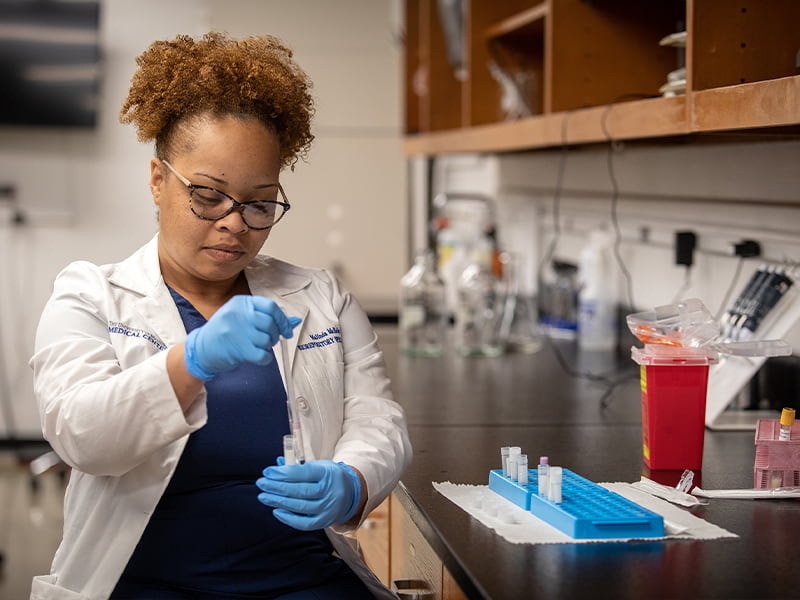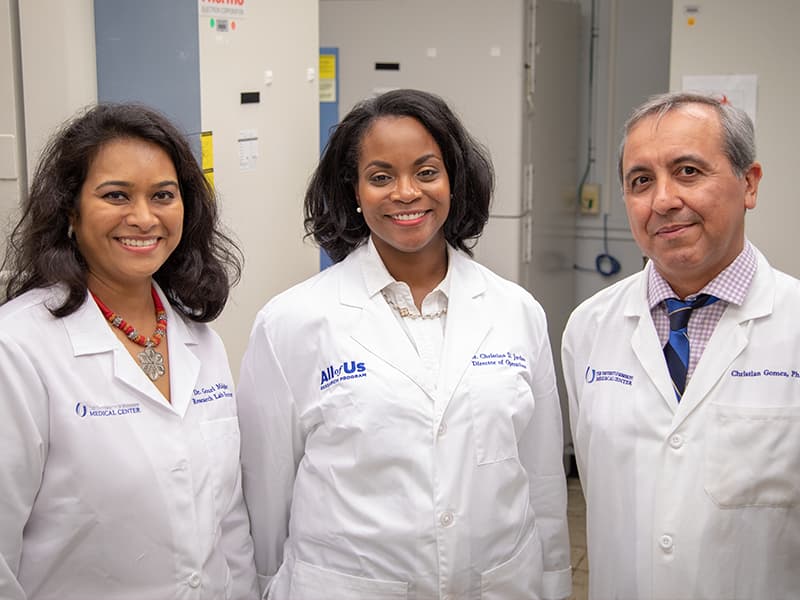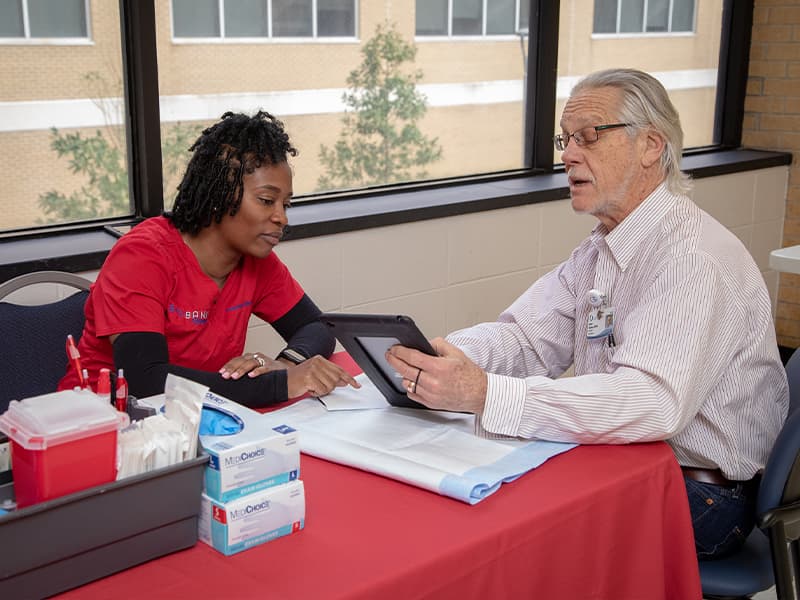Biobank builds up new leadership, research efforts

There’s a wealth of information stored in the University of Mississippi Medical Center’s Biobank. Its value? In the hands of a scientist with research questions in mind, it could help secure a new grant or help find a novel treatment for a disease.
A biobank is like a reference library. Instead of books and journals, it contains blood and tissue specimens. UMMC’s collection has samples from more than 3,500 participants, each with accompanying information from the donor. And like a library, the Biobank needs to make acquisitions regularly to stay up-to-date.
Since last summer, the Biobank has reshaped its leadership team and refocused its specimen-collection efforts. Three UMMC scientists are at the helm: Dr. Gouri Mahajan is the research laboratory director, Dr. Christina Jordan is director of operations, and Dr. Christian Gomez is the interim executive director.

“We are looking for ways to enhance and broaden our recruitment efforts,” said Gomez, an associate professor of pathology and radiation oncology. “Strategies for enrollment are key for our success.”
One way to do that is by looking for help from UMMC doctors, Jordan said.
“Physicians have established relationships with their patients, which puts them in a better position to share information with patients who may be interested in becoming participants,” Jordan said.
In 2011, the Biobank started as the University Biospecimen Repository, collecting cancer-related surgical specimens such as tumor resections. Since then, it has expanded to include blood, gastrointestinal, heart, transplant and other tissue types. Medical Center researchers can request access to biobank specimens for their own independent studies.
The Biobank is also stepping up collection efforts for two large-scale projects. The first is Biobank Mississippi. Formerly known as the UMMC 10K project, the program’s goal is to collect a health questionnaire and a blood sample from ten thousand UMMC adult patients.
Biobank Mississippi is an important piece of UMMC’s growing affiliation with the Mayo Clinic in Rochester, Minnesota. Researchers at both institutions will be able to use the specimens and related health information for their own studies.
Mahajan, who leads efforts on Biobank Mississippi, traveled to Mayo last fall to discuss opportunities for joint studies.
“The administration at both institutions is very supportive of the Biobank,” Mahajan said. “They are happy with the progress we’ve made so far and made a serious commitment.”
The UMMC Biobank is also coordinating local collection efforts with the University of Alabama at Birmingham for the National Institutes of Health-sponsored All of Us research study. Nationally, the project hopes to enroll one million participant across the United States by collecting health surveys, blood, biological metrics, and urine samples over the next three and a half years, with ten thousand of those in Mississippi.

“We are focusing on recruiting All of Us participants on UMMC’s campus first, then explore enrollment and engagement efforts in the Jackson community,” said Jordan, who leads the effort locally Future events include local health fairs, gyms, and partnerships with other health-care organizations, she said.
The entire national dataset for All of Us will be available for researchers across the country to use for studies on human health and disease.
All of Us and Biobank Mississippi are separate programs and require separate enrollment, they have some similarities. Both are open to adults and want to recruit healthy individuals as well as those with health conditions. That’s because the projects have the same aim: to build a large data set which scientists can use to study nearly any disease.
Having tens of thousands of samples to study makes it possible for scientists to make valuable discoveries about rare diseases as well as common conditions such as type 2 diabetes that can have multiple contributing risk factors.
Through all of its projects, the UMMC Biobank’s goal is to help build a new, robust collections that can rival other large health studies, such as the National Health and Nutrition Examination Survey, Gomez said. But to do that, scientists need to propose studies that can use and validate the value of these datasets.
“Looking forward, we have to ask, ‘what can we do with the data?’” Gomez asked.
As interim executive director, Gomez said his role at the Biobank is “to provide scientific oversight, generate ideas for projects and grant applications and develop collaborations with other institutions.”
As it grows, the Biobank is also looking for ways to harness even more data from its collection.
“Eventually, we would like to be able to bring whole genome sequencing in-house,” Mahajan said.
The Biobank Mississippi project has recruiting tables set up across the Medical Center. They are regularly staffed at the Jackson Medical Mall and near the elevators in University Hospital on the second Tuesday of each month, and outside of lecture room R153 on the third and fourth Thursday of each month. For more information about the UMMC Biobank, call 601-815-3174.
The All of Us program actively recruits at the Jackson Medical Mall in a clinic behind the center stage, near UMMC’s Gift Shop at the front entrance of the main campus, and by appointment in the University Rehabilitation building’s Outpatient Clinic Research Unit (OCRU) clinic. For more information about the All of Us program, call Project Manager Donielle Drakes at 601-815-5149.


